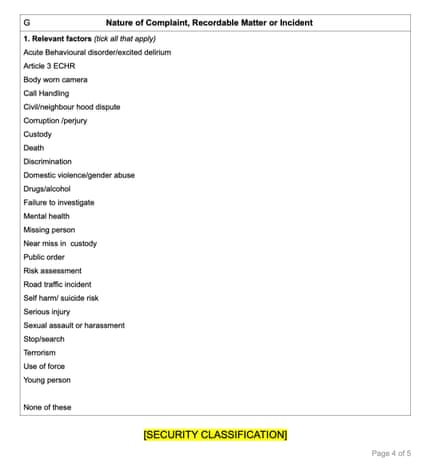The police watchdog for England and Wales has removed a controversial medical term from its incident forms after claims it plays into racist stereotypes and detracts attention from police brutality.
Until now, police forces referring a death or serious incident to the Independent Office for Police Conduct (IOPC) have been given the option to tick “excited delirium” in a list of relevant factors. The term has historically been used to describe people who are agitated or acting bizarrely, usually because of mental illness, drug use or both. Symptoms are said to include insensitivity to pain, aggression, increased strength and elevated heart rate.
But it is not a recognised medical condition, is rooted in pseudoscience and has been criticised for playing into racial tropes about superhuman strength, which campaigners say can lead to increased use of police force.
In 2021, excited delirium was mentioned in the trial of Derek Chauvin, the former US police officer found guilty of the murder of George Floyd. Police officers discussed whether Floyd might have excited delirium as they restrained him.
It has also come up in police restraint cases in Britain.
Last month, an Observer investigation found excited delirium and the alternative term “acute behavioural disturbance”, as it is now more commonly known in Britain, had been cited as a cause of death, or a contributing factor, in IOPC reports and inquests in at least 44 police restraint death cases since 2005.
A disproportionate number of the cases where it was used involved black and ethnic minority men in mental health crisis.
In its statement the IOPC said it had now reviewed the use of the term excited delirium on its official referral forms and decided to remove it.
A spokesperson said that “following recent public debate” it had “decided to stop using the term ‘excited delirium’ as we recognise that it is language which is outdated and potentially offensive.
“We are in the process of removing it from IOPC forms that police forces use to make referrals to us and will not use the term as an option for categorising our investigations,” they said.

The watchdog, which oversees complaints about police forces, said it planned to keep references to acute behavioural disturbance for now because although this was also controversial, it was “currently used by police and coroners and we need to be able to identify its use”.
It is not clear why excited delirium remained in official IOPC paperwork for so long.
The term originated in Miami in the 1980s after 32 black women who worked as sex workers were found dead, naked from the waist down and with no obvious injuries. A medical examiner concluded they must have died from cocaine and sex, a phenomenon he termed “excited delirium”.
The women were later found to have been murdered, but use of the term persisted. It was also claimed that men in states of excited delirium would become extra strong and impervious to pain.
Excited delirium has since been put forward by police and their lawyers to explain deaths after police intervention in the US and elsewhere.
Seven years ago, a Home Office-commissioned review into deaths in police custody said the term should be removed from guidance for police officers.
after newsletter promotion
Elish Angiolini, who chaired the inquiry into policing issues arising from the murder of Sarah Everard by a serving officer, wrote that it was a “contentious and controversial term”. Lady Angiolini also said any mention of it in police death cases could become “the focus of an investigation, and the use of any restraint may be subsequently downplayed”.
The Royal College of Psychiatrists has said the term plays into racial stereotypes and should not be used.
Deborah Coles of the human rights charity Inquest said the use of excited delirium on IOPC referral forms was “outrageous” and that she was “surprised and disappointed” by its inclusion, adding that IOPC investigations “very often inform the evidence that comes out at the inquest”.
She said its removal was a “welcome step” but would only have a true impact if the watchdog also strengthened its approach to investigating restraint deaths, including properly scrutinising the use of force and the potential role of racism.
Coles also criticised the IOPC for a “serious error” in an initial announcement about the change, when it said it would keep references to “acute behavioural disorder”. It has since clarified that this was meant to be acute behavioural disturbance.
It is an important distinction because while acute behavioural disturbance is used by emergency services as an umbrella term to describe symptoms that might suggest someone is in crisis, calling it a “disorder” perpetuates the myth it is a genuine medical condition.
Campaigners and the families of people who died after police restraint say this confusion has led to excited delirium and acute behavioural disturbance being listed as a contributing factor or cause of death, while the role of restraint has been minimised.
The issue of excited delirium has received renewed attention in recent months since the release of a podcast series by journalist Jon Ronson, Things Fell Apart, which delved into the origins of the term and its use by US police.
Two US states – California and Colorado – recently banned excited delirium from being recorded as a cause of death in police custody cases.
The College of Policing for England and Wales is reviewing its guidance on acute behavioural disturbance. Existing training materials say restraint should not be used when someone is displaying signs of acute behavioural disturbance unless absolutely necessary.
